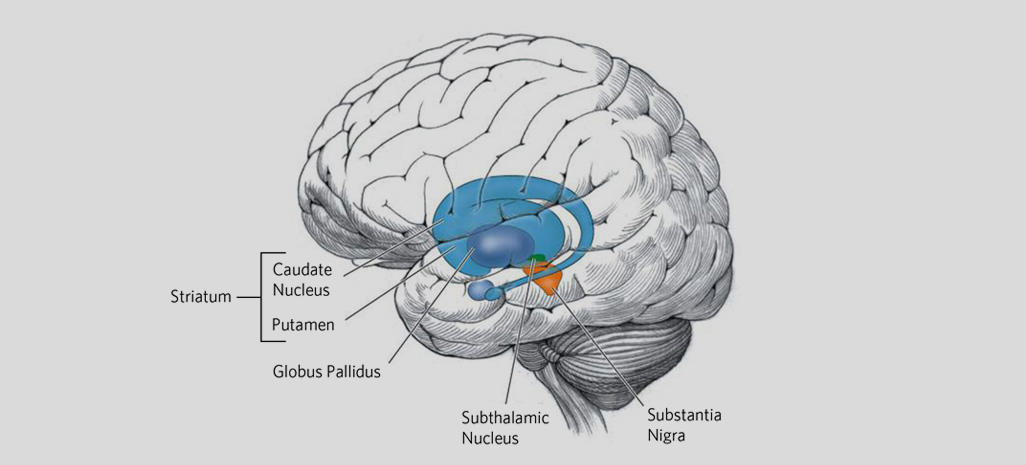Huntington's Disease

HD affects the whole brain, but certain areas are more vulnerable than others. Pictured above are the basal ganglia - a group of nerves cell clusters, called nuclei. These nuclei play a key role in movement and behavior control and are the parts of the brain most prominently affected in early HD.
Huntington’s disease (HD) is a fatal genetic disorder that causes the progressive breakdown of nerve cells in the brain. It deteriorates a person’s physical and mental abilities during their prime working years and has no cure. HD is known as the quintessential family disease because every child of a parent with HD has a 50/50 chance of carrying the faulty gene. Today, there are approximately 30,000 symptomatic Americans and more than 200,000 at-risk of inheriting the disease.
Many describe the symptoms of HD as having ALS, Parkinson’s and Alzheimer’s – simultaneously.
Symptoms usually appear between the ages of 30 to 50, and worsen over a 10 to 25 year period. Ultimately, the weakened individual succumbs to pneumonia, heart failure or other complications. Everyone has the gene that causes HD, but only those that inherit the expansion of the gene will develop HD and perhaps pass it on to each of their children. Every person who inherits the expanded HD gene will eventually develop the disease. Over time, HD affects the individual’s ability to reason, walk and speak.
Symptoms Include:
- Personality changes, mood swings & depression
- Forgetfulness & impaired judgment
- Unsteady gait & involuntary movements (chorea)
- Slurred speech, difficulty in swallowing & significant weight loss
Taken from Huntington’s Disease Society of America
Although symptoms of HD vary from person to person, even within the same family, the progression of the disease can be roughly divided into three stages.
Early stage HD usually includes subtle changes in coordination, perhaps some involuntary movements (chorea), difficulty thinking through problems and often a depressed or irritable mood. Medications are often effective in treating depression or other emotional problems. The effects of the disease may make the person less able to work at their customary level and less functional in their regular activities at home.
In the middle stage, the movement disorder may become more of a problem. Medication for chorea may be considered to provide relief from involuntary movements. Occupational and physical therapists may be needed to help maintain control of voluntary movements and to deal with changes in thinking and reasoning abilities. Diminished speech and difficulty swallowing may require help from a speech language pathologist. Ordinary activities will become harder to do.
In the late stage, the person with HD is totally dependent on others for their care. Choking becomes a major concern. Chorea may be severe or it may cease. At this stage, the person with HD can no longer walk and will be unable to speak. However, he or she is generally still able to comprehend language and retains an awareness of family and friends. When a person with HD dies, it is typically from complications of the disease, such as choking or infection and not from the disease itself.
In all stages of HD, weight loss can be an important complication that can correspond with worsening symptoms and should be countered by adjusting the diet and maintaining appetite.
.
